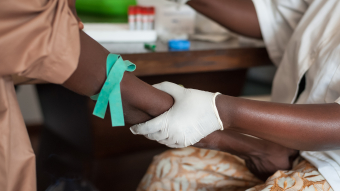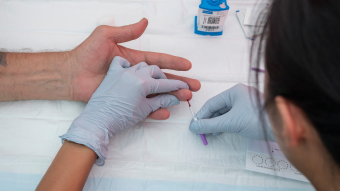The Kirby Institute has 14 research programs, each dedicated to a specific aspect of our broad-ranging research on infectious diseases. Our programs are headed by world leaders in their fields and are made up of cross-disciplinary and collaborative teams. Our diverse programs and research strengths bring a wealth of expertise and experience to every project and study we work on.
Asia and Pacific Health Program
The Asia and Pacific Health Program is dedicated to improving sexual reproductive and maternal health in low- and middle-income countries in the Asia-Pacific and globally.
Biosecurity Program
The program is focused on detection, prevention, mitigation and response to emerging infectious diseases, pandemics and bioterrorism.
Biostatistics and Databases Program
Our program undertakes research activities based on developing and applying modern statistical and mathematical techniques to investigate the incidence of infection, risk factors, trends and the effectiveness of interventions related to infectious diseases.
Global Health Program
The program carries out multidisciplinary research and related activities aimed at improving the health of populations at higher risk of adverse health outcomes in Australia and in low- and middle-income countries.
HIV Epidemiology and Prevention Program
The program conducts research into the transmission and prevention of HIV, other sexually transmissible infections, and the consequences of infection.
Infection Analytics Program
Our program uses mathematical and computational approaches to better understand immunity to major infectious disease threats such as HIV and malaria.
Immunovirology and Pathogenesis Program
Our program works in the Kirby Institute laboratories to uncover new knowledge on how the human immune system responds to infectious agents.
Sexual Health Program
The program engages in research into the epidemiology, surveillance, microbiology, clinical management, and prevention of sexually transmissible infections.
Surveillance and Evaluation Research Program
The program monitors the pattern of transmission of HIV, viral hepatitis and sexually transmissible infections in Australia.
Therapeutic and Vaccine Research Program
The program conducts clinical studies across a range of infectious diseases, with a particular focus on therapies for HIV, hepatitis B and COVID-19, as well as complications from infectious diseases more broadly.
Viral Hepatitis Clinical Research Program
Our program undertakes world-class epidemiological, clinical, and laboratory research that improves outcomes for people living with viral hepatitis.
Viral Hepatitis Epidemiology and Prevention Program
The program conducts research on key infections, including viral hepatitis and HIV, in vulnerable populations, which include people who use/inject drugs, sex workers and men who have sex with men.
Viral Immunology Systems Program
We utilise inter-disciplinary approaches to study the complex interactions between pathogen, host, and environment, which underpin human viral infections, particularly hepatitis C.
Yandamanjang First Nations Health Research Program
Yandamanjang undertakes First Nations health research at the Kirby Institute.














